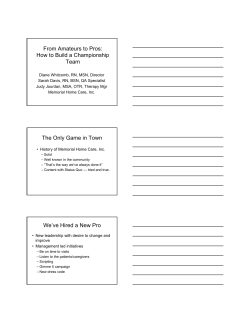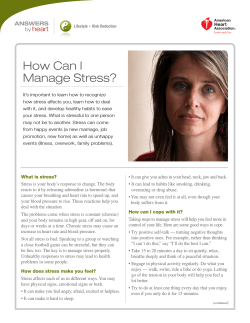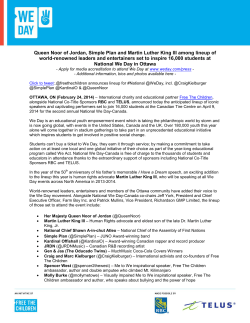
10 Steps To Conquering Your Fear of Public Speaking
10 Steps To Conquering Your Fear of Public Speaking Public speaking is a common source of stress for everyone. Many of us would like to avoid this problem entirely, but this is hard to do. Whether we work alone or with large numbers of people, eventually we will need to speak in public to get certain tasks accomplished. And if we want to be leaders or achieve anything meaningful in our lives, we will often need to speak to groups, large and small, to be successful. The truth about public speaking, however, is IT DOES NOT HAVE TO BE STRESSFUL! If you correctly understand the hidden causes of public speaking stress, and if you keep just a few key principles in mind, speaking in public will soon become an invigorating and satisfying experience for you. Key Principles Principle #1--Speaking in Public is NOT Inherently Stressful (Rick’s Pick For #1 Most Important) Most of us believe parts of life are inherently stressful. In fact, most of us have been taught to believe that life as a whole is very stressful! To deal with any type of stress effectively, we must first understand that life itself, including public speaking, is NOT inherently stressful. Thousands of human beings have learned to speak in front of groups with little or no stress at all. Many of these people were initially terrified to speak in public. Their knees would shake, their voices would tremble, their thoughts would become jumbled . . . you know the rest. Yet they learned to eliminate their fear of public speaking completely. You are no more or less human than they are. If they can conquer the fear of public speaking, so can you! It just takes the right guiding principles, the right understanding, and the right plan of action to make this goal a reality. Believe me, it's not difficult. I'm a good example of someone who conquered the fear of public speaking. And while I didn't do it overnight, it wasn't difficult. All it took was approaching the problem in the right way. Notes: ___________________________________________________________________________________________ _________________________________________________________________________________________________ _________________________________________________________________________________________________ Principle #2--You Don't have to be Brilliant or Perfect to Succeed Many of us have observed public speakers and thought to ourselves "Wow, I could never be that smart, calm, witty, entertaining, polished . . . or whatever." Well, I've got news for you-- you don't have to be brilliant, witty, or perfect to succeed. That is not what public speaking is all about. I know it may look that way, but it's not. You can be average. You can be below average. You can make mistakes, get tongue-tied, or forget whole segments of your talk. You can even tell no jokes at all and still be successful. It all depends on how you, and your audience, define "success." Believe me, your audience doesn't expect perfection. Placing incredible pressure on yourself to deliver a perfect performance can have you working for days to prepare a talk. You can stay up nights worrying about making mistakes. You can spend hours and hours rehearsing what you are going to say. And you know what? All this will do is make you even more anxious! The more perfect you try to be, the worse you will do! The essence of public speaking is this: give your audience something of value. That's all there is to it. If people in your audience walk away with something (anything) of value, they will consider you a success. If they walk away feeling better about themselves, feeling better about some job they have to do, they will consider you a success. If they walk away feeling happy or entertained, they will consider their time with you worthwhile. Even if you pass out, get tongue-tied, or say something stupid during your talk . . . they won't care! Give them value, and they will be thankful for the time they spent being with you and you will walk away knowing you were a success. Notes: ___________________________________________________________________________________________ _________________________________________________________________________________________________ _________________________________________________________________________________________________ Principle #3--All You Need is Two or Three Main Points You don't have to deliver mountains of facts or details to give your audience what they truly want. Many studies have shown that people remember very few of the facts or information speakers convey. While you may choose to include lots of facts and information, you only need to make two or three main points to have your talk be successful. You can even have your whole talk be about only one key point, if you wish. A twenty-page typed manuscript can give way to a fivepage detailed outline. Then, you can replace that outline with ten or fifteen index cards. Eventually, you could conduct a full two-hour seminar with only one 3X5 index card (containing my two or three key points) to support you! As long as you focus on these two or three key points, you will be able to speak at length about them by naturally drawing upon my past experiences and knowledge. Remember, all your audience wants from you is to walk away with one or two key points that will make a difference to them. If you structure your talks to deliver this result, you can avoid lots of complexity. Notes: ___________________________________________________________________________________________ _________________________________________________________________________________________________ _________________________________________________________________________________________________ Principle #4--You Also Need a Purpose That is Right for the Task This principle is very important . . . so please listen up. One big mistake people make when they speak in public is they have the wrong purpose in mind. Often, they have no specific purpose in mind, but the one that is operating within them unconsciously causes a whole lot of unnecessary stress and anxiety. This is a prime example of what is called a "hidden cause" of public speaking stress. When you first start speaking in public, you may think your purpose is to get everyone in the audience to approve of you. You will mistakenly think this is what good public speaker does. You wont be consciously aware of this purpose, nor how foolish it is, but it is there nonetheless. Because of this hidden purpose, you will feel you needed to be absolutely perfect and brilliant to win your audience's unanimous approval. The truth about public speaking is no matter how good a job you do . . . someone is going to disapprove of either you or your argument. That is just human nature. Remember, the essence of public speaking is to give your audience something of value. The operative word here is GIVE not GET! The purpose of public speaking is not for you to get something (approval, fame, respect, sales, clients, etc.) from your audience. It is to give something useful to your audience. Think about it for a moment, giving of yourself is rarely stressful or anxiety producing, especially when you are clear about your purpose for being there. Notes: ___________________________________________________________________________________________ _________________________________________________________________________________________________ _________________________________________________________________________________________________ Principle #5--The Best Way to Succeed is Not to consider Yourself a Public Speaker! (Rick’s Pick For #2 Most Important) While it may seem paradoxical, the best way to succeed as a public speaker is not to consider yourself a public speaker at all. Many of us have distorted, exaggerated views of what successful public speakers do. We often assume that to be successful ourselves, we must strive very hard to bring forth certain idealistic qualities we presently lack. Consequently, we struggle desperately to emulate those personal characteristics of other speakers, which we wrongly believe are responsible for their public speaking success. In other words, we try to become someone other than ourselves! We try to be a public speaker, whatever that image means to us. The truth about public speaking is that most successful speakers got that way by doing just the opposite! They didn't try to be like somebody else. They just gave themselves permission to be themselves in front of other people. And much to their surprise, they discovered how much fun they could have doing something most other people dread. The secret, then, to their success is that they didn't try to become public speakers! You and I can do the very same thing. No matter what type of person we are, or what skills and talents we possess, we can stand up in front of others and fully be ourselves. Don't try to give talks the way I do, or the way anyone else does. Just go out there, armed with a little knowledge and a few key points, and be yourself. Everything else will usually work out. It might be a little rough the first few times you try it, but after a while, you'll settle into some very successful ways of being that will be all yours and no one else's. 2 Notes: ___________________________________________________________________________________________ Principle #6--Humility and Humor Can Go a Long Way (Rick’s Pick For #3 Most Important) While each person will eventually find his or her style of public speaking, certain maneuvers can be used by almost everyone. Two of these, humility and humor, can go a long way to making your talks more enjoyable and entertaining for your audience. Humor is well understood by most of us, so little needs to be said about it here. If being humorous feels comfortable for you, or if it fits your speaking situation, go for it. It usually works, even if you don't do it perfectly. By humility, I mean standing up in front of others and sharing some of your own human frailties, weaknesses, and mistakes. We all have weaknesses, you know, and when you stand up in front of others and show that you're not afraid to admit yours, you create a safe, intimate climate where others can acknowledge their personal shortcomings as well. Being humble in front of others makes you more credible, more believable, and paradoxically more respected. You become "one of them" instead of a remote expert who's head and shoulders above them (which you really aren't). True humility is easily distinguished from the pretense of acting humble. If you pretend, your audience will perceive this and lose respect for you. Often, humor and humility can be combined very effectively. Telling humorous stories about yourself, or using your own personal failings to demonstrate some point you are trying to make, can be both entertaining and illuminating. For example, if you get nervous when you stand up to speak in front of a group, or if you suddenly feel nervous during the middle of your talk, don't hide this fact from your audience (they can tell anyway). Be real--and humble--by acknowledging your fear openly and honestly. Ask your audience for forgiveness while you take a few moments to collect yourself. Notes: ___________________________________________________________________________________________ _________________________________________________________________________________________________ _________________________________________________________________________________________________ Principle #7--When You Speak in Public, Nothing "Bad" Can Ever Happen! One thing that adds to the fear of public speaking is the dread people have that something awful, terrible, or publicly humiliating will happen to them. What if I pass out from nervous exhaustion? What if I forget everything I intended to say and am left standing there, totally speechless? What if the audience hates me and begins throwing things at me? What if they all get up and leave after the first ten minutes? What if they snipe at me with harsh questions or comments once I'm done? What if someone in the audience tries to turn the group against me? These could be embarrassing if they occurred. Fortunately, most of them don't happen. Even when they do, it's useful to have a strategy in mind that has them turn out perfect. Sound difficult? It's not really. It’s true that most of the "negative" things that happen when speaking can be handled by keeping this one simple, but powerful, principle in mind: everything that happens can be used to my advantage. If people get up and start to head for the door, you can stop what you’re doing and ask for feedback. Ask yourself, “Was there something about my topic, my style, or my manner of presentation that was offensive to them?” Regardless of what you may discover, just stopping to deal with this situation, honestly and humbly, will often score points with your audience. Asking questions of your audience will help build a bridge between the two of you. It also will give you the opportunity to learn how you are affecting people, so you can make any corrections that might be needed. Even if everyone walked out and refused to give you a reason, you could ultimately find ways to benefit from this experience. At the very least, you could use it as the opening for your next presentation. "You know, I gave this same talk the other day and everyone in the audience walked out in the first ten minutes. That's my current record, so I guess we'll just have to see what happens today." The same principle holds for dealing with hecklers or people who ask harsh or confrontational questions. If you assume that nothing truly bad can ever happen when you're speaking in public, you'll be amazed how well you can relate to such events and how often you can indeed use them to your advantage. And once you've successfully used this principle, your anxiety about public speaking will most likely diminish very quickly. TIP: If you want a good role model for developing this skill, rent a video tape of Johnny Carson's opening monologues. He was a master at using this principle. No matter how his audience responded, Carson was always ready to use their response, positive or negative, to make another joke. He simply couldn't lose, even if the material provided him was rotten. Notes: ___________________________________________________________________________________________ _________________________________________________________________________________________________ _________________________________________________________________________________________________ 3 Principle #8--You Don't Have to Control the Behavior of Your Audience To succeed as a public speaker, you don't have to control the behavior of your audience. There are certain things you do need to control--your own thoughts, your preparation, arrangements for audio-visual aids, how the room is laid out--but one thing you don't have to control is your audience. They will do whatever they do, and whatever they do will usually be "perfect." If people are fidgety or restless, don't try to control this. If someone is talking to a neighbor, or reading the newspaper, or falling asleep, leave them alone. If people look like they aren't paying attention, refrain from chastising them. Unless someone is being intentionally disruptive, there is very little you need to control. Thinking you need to change or control other people is a hidden cause of stress in many areas of life and can certainly cause unneeded anxiety. Notes: ___________________________________________________________________________________________ _________________________________________________________________________________________________ _________________________________________________________________________________________________ Principle #9--In General, the More You Prepare, the Worse You Will Do Preparation is useful for any public appearance. How you prepare, however, and how much time you need to spend are other matters entirely. Many of the errors in thinking we've discussed so far often creep in to people's strategies for preparation. If you have the wrong focus (i.e., purpose), if you try to do too much, if you want everyone to applaud your every word, if you fear something bad might happen or you might make a minor mistake, then you can easily drive yourself crazy trying to over prepare your talk. In these instances, the more effort you put in, the worse you probably will do. On the other hand, if you know your subject well, or if you've spoken about it many times before, you may only need a few minutes to prepare sufficiently. All you might need is to remind yourself of the two or three key points you want to make, along with several good examples and supporting facts and . . . BOOM you're ready to go. Over preparation usually means you either don't know your subject well or you do, but you don't feel confident about your ability to speak about it in public. In the former instance, you'll need to do some extra research. In the latter, you'll need to develop trust in your natural ability to speak successfully. The only way to do this is to put yourself in the spotlight, over and over again. Go out and solicit opportunities to speak on your subject in public. Offer to speak free or for a small fee, enough to cover your expenses. If you have something of value to tell others, keep getting in front of people and deliver it. In no time at all, you'll gain confidence. You'll also begin to respect the natural public speaker/communicator within you. Notes: ___________________________________________________________________________________________ _________________________________________________________________________________________________ _________________________________________________________________________________________________ Principle #10--Your Audience Truly Wants You to Succeed The last principle to remember is that your audience truly wants you to succeed. Most of them are scared to death of public speaking, just like you. They know the risk of embarrassment, humiliation, and failure you take every time you present yourself in public. They feel for you. They will admire your courage. And they will be on your side, no matter what happens. This means that most audiences are truly forgiving. While a slip of the tongue or a mistake of any kind might seem a big deal to you, it's not very meaningful or important to your audience. Their judgments and appraisals will usually be much more lenient than yours. It's useful to remind yourself of this point, especially when you think you've performed poorly. Notes: ___________________________________________________________________________________________ _________________________________________________________________________________________________ _________________________________________________________________________________________________ 4 Review Of 11 Hidden Causes Of Public Speaking Stress 1. 2. 3. 4. 5. 6. 7. 8. Thinking that public speaking is inherently stressful (it's not). Thinking you need to be brilliant or perfect to succeed (you don't). Trying to impart too much information or cover too many points in a short presentation. Having the wrong purpose in mind (to get rather than to give/contribute). Trying to please everyone (this is unrealistic). Trying to emulate other speakers (very difficult) rather than simply being yourself (very easy). Failing to be personally revealing and humble. Being fearful of potential negative outcomes (they almost never occur and even when they do, you can use them to your advantage). 9. Trying to control the wrong things (e.g., the behavior of your audience). 10. Spending too much time over preparing (instead of developing confidence and trust in your natural ability to succeed). 11. Thinking your audience will be as critical of your performance as you might be. Review of 10 Key Principles To Always Keep In Mind #1---Speaking in Public is NOT Inherently Stressful #2---You Don't Have to be Brilliant or Perfect to Succeed #3---All You Need is Two or Three Main Points #4---You also Need a Purpose That is Right for the Task #5---The Best Way to Succeed is NOT to Consider Yourself a Public Speaker! #6---Humility and Humor Can Go a Long Way #7---When You Speak in Public, Nothing "Bad" Can Ever Happen! #8---You Don't Have to Control the Behavior of Your Audience #9---In General, the More You Prepare, the Worse You Will Do #10--Your Audience Truly Wants You to Succeed That's all there is to it. Just look for these eleven hidden causes and keep the ten corresponding principles in mind. Of course, you will need to practice. It's extremely easy to forget the ten key principles. No matter how often you review them, you'll instinctively fall back into your old stress-producing patterns. What is the best way to practice? Go out and speak in public. Join a local Toastmasters Group if you like. Take a community college course in public speaking. Better yet, offer to teach a course about something you know very well. Just keep throwing yourself into the arena, and in no time at all, your skill, confidence, and natural ability will come to the surface. And remember, if you get up in front of a group and find this stressful, it only means you forgot the truth about what public speaking is all about. Go back and review this document. Find out what you did wrong or what you didn't remember. Then go back out and speak again until you get it right. It may take time, but the long-term rewards will be impressive. Research & Presentation Provided By: Rick Weaver, Chief Inspiration Officer, Armarion Solutions Resource: Morton C. Orman, M.D. © 1996-2005, M. C. Orman, MD, FLP. All rights reserved Session Presenter: Rick Weaver, Chief Inspiration Officer Armarion Solutions 111-32 76th Avenue, #5B, New York, NY 11375-6405 (718) 544-4851 direct http://www.armarionsolutions.com | rweaver@armarionsolutions.com 5
© Copyright 2025





















